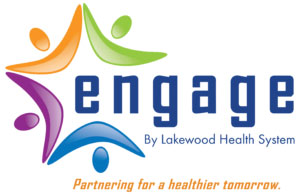Dec 23, 2020
Lakewood Engage Tackles Food Insecurity in Rural Minnesota
by Kathryn Rutz
When staff at Lakewood Health System, located in rural Minnesota, started discussing how they might address social factors affecting their patients' health, they kept coming back to food access. Patients experiencing food insecurity faced greater health disparities and often found it difficult to follow through on their care outside of the clinic.

Alicia Bauman, the Community Health Director for Lakewood Health System, gave an insight into the type of difficulties that clinic staff encounters. A doctor was frustrated that a patient hadn't been taking her medication, even though the patient had been filling all her prescriptions. The doctor struggled to figure out why, until realizing that the medication needs to be taken three times a day with food ― and the patient admitted that she can only afford to eat one meal per day. "Their ability to take their medication was hindered not by accessing that medication, but by the ability to have consistent and stable access to food," Bauman explained.
Unfortunately, this is not an isolated example. According to the 2019 American Community Survey 5-year estimates, in Staples where Lakewood's main campus is located, 13.0% of families and 17.8% of the general population live below the poverty line. The area is classified by the USDA as a food desert, where getting access to fresh food is difficult. Depending on where a resident is located, the nearest grocery store can be over an hour away, and transportation issues often complicate the matter. In addition, the community has a greater-than-average number of older adults, and those numbers continue to grow as residents age and young people leave the area. Between financial, transportation, and age-related difficulties, the community faces a broad spectrum of food insecurity.
 In an effort to combat this problem and improve
the well-being of their patients, in 2013 Lakewood Health
System created the
Lakewood Engage program to address the issue of food
access, specifically fresh fruits, vegetables, and meat.
Since Lakewood Engage took the lead on hunger, it has
grown into six different initiatives.
In an effort to combat this problem and improve
the well-being of their patients, in 2013 Lakewood Health
System created the
Lakewood Engage program to address the issue of food
access, specifically fresh fruits, vegetables, and meat.
Since Lakewood Engage took the lead on hunger, it has
grown into six different initiatives.
Addressing Hunger Through Healthcare
The first and most crucial step that the Lakewood Engage program undertakes is screening every patient for food insecurity. Annually, Lakewood Engage conducts around 30,000 food insecurity screenings. Each clinic is equipped with "acute care packs" filled with non-perishable food items that can be sent home with patients identified as being food insecure. Rather than referring patients to local food pantries and similar organizations that operate with specific hours in another location, clinicians have an immediate response, which they can follow up with recommendations of programs that will provide long-term services. Bauman explains the benefit of having a quick and tangible response available: "That really helps not only build a relationship with the patient by addressing that need right away, but it also gives providers and care teams a resource to do something in the moment."
[Providing acute care packs] really helps not only build a relationship with the patient by addressing that need right away, but it also gives providers and care teams a resource to do something in the moment.
Lakewood Engage's Food Farmacy is one of the cornerstone programs of their health initiatives, providing patients with their "prescription" of fresh, locally grown produce. By adding an influx of nutritious fruits and vegetables, patients aren't only getting fed ― they're eating healthier. On average, the Food Farmacy distributes 4,000 pounds of food each month, including fresh fruit, vegetables, and meat. Each package is based on household size and financial need.
However, not all those enrolled in Lakewood Engage are able to get transportation to the Food Farmacy. With this in mind, Lakewood Engage developed its place-based initiative: Fresh Delivered. Fresh Delivered brings the same fresh produce and meat "prescription" to community residents who live in apartment housing units for seniors with low incomes or disabilities. Deliveries take place twice a month, and aside from the availability of nutritious, fresh food, Bauman and her team saw another benefit. "We all love to gather around food, especially here in the Midwest," she explained. On delivery days, residents gather to receive their groceries, creating a community space. One building coordinates a potluck. Another hosts a canning party. "You can't design that. It's so cool how food brings people together, and how those buildings have really embraced opportunities to grow with [the program] together."
We all love to gather around food, especially here in the Midwest.
Another delivery program helps distribute fresh-frozen microwave meals to older adult patients recovering from surgery, and, more recently, patients who have tested positive for COVID-19. Each meal was designed by a licensed dietician and prepared by Hilltop Regional Kitchen, a local facility. All meals are made with fresh ingredients and frozen right after their preparation, which gives them higher nutritional value and requires less food processing than typical frozen dinners. The program first started when hospital staff realized the difficulty their older adult patients had when recovering from major surgery. The patients' mobility was often impacted, making it difficult to go out to buy groceries; and healthy food can be difficult to prepare once they have it, as cooking often requires dexterity and standing for periods of time. Lakewood Engage provides 28 days of fresh-frozen meals, enabling their patients to heal without experiencing the mental and physical stress of shopping and cooking for themselves after major surgery.
For COVID-positive patients, these fresh-frozen meals mean they can quarantine immediately after getting the results of their tests, rather than having to go out and buy two weeks' worth of food to prepare. This means less exposure for the entire community. In addition, if adults are sick, it impacts their ability to provide for themselves and their families. If the patient indicates that they have need, meals are provided for their whole family, as the patient may feel too ill to prepare and cook food. This program makes sure that not only the recovering patient but their entire family have nutritionally complete meals for the two-week isolation period.
Community-Based Initiatives
Lakewood Engage has always paid special attention to family health. Food insecurity screenings are standard practice at Lakewood's pediatric clinic, with resources allocated by family size. However, Lakewood has gone beyond just the clinical setting to partner with local schools to create Cardinal PAX, a program that makes sure that students and their families have food even on weekends and holidays. Each child enrolled in the program gets a pack full of enough nonperishable food items to last them until the next time school is in session. "We serve about 70 kids each school year and then partner with some summer options too," Bauman estimated. And the number is growing. "We know our population is under-utilizing social support systems like SNAP benefits and WIC."
 Another community-based initiative was Lakewood
Engage's involvement in creating the Staples Area Farmers
Market. This has increased the number of fresh, locally
grown produce options available near their patients, as
opposed to grocery stores that are located much farther
away and may not have the same variety. For participants
who may not be able to afford enough fruits and
vegetables at their regular market price, Lakewood Engage
provides farmers market vouchers. Aside from helping the
community get fresh fruits and vegetables, however, the
farmers market also creates more demand for that produce,
encouraging local farmers to grow more and provide for
their community.
Another community-based initiative was Lakewood
Engage's involvement in creating the Staples Area Farmers
Market. This has increased the number of fresh, locally
grown produce options available near their patients, as
opposed to grocery stores that are located much farther
away and may not have the same variety. For participants
who may not be able to afford enough fruits and
vegetables at their regular market price, Lakewood Engage
provides farmers market vouchers. Aside from helping the
community get fresh fruits and vegetables, however, the
farmers market also creates more demand for that produce,
encouraging local farmers to grow more and provide for
their community.
Community Health Benefits
With this expansive focus on food availability, Lakewood has seen a variety of benefits for their patients and the community at large. "It's important to have the conversation about how families are impacted by their environment, and the ways that environment affects their health and well-being outside our clinical walls," Bauman explained. "I think we're more advanced in understanding that we can prescribe all the things we want, but if families are heading home in an environment where they're not able to follow those recommendations, we're never going to get over some of those health issues." Emergency room visits have decreased from an average of 2.9 per participant to 1.8 over the last 12-month cycle.
…we can prescribe all the things we want, but if families are heading home in an environment where they're not able to follow those recommendations, we're never going to get over some of those health issues.
Bauman gave an example of how a Lakewood Engage program could link directly back to the clinical health of their patients. A man might come into the Food Farmacy with a noticeable limp, and the staff member has a chance to ask about it. He answers that it's just a little sore, but the staff member knows that the man is diabetic. Because of the relationship built over time with the patient, who may come in as often as every week to pick up his groceries, the staff is able to convince him to make an appointment at the clinic when it otherwise would have gone untreated longer, if it was treated at all. "And so, we're able to bridge that clinic visit in the moment before things grow and fester and triage the appropriate care at the appropriate time."
By examining the need of their patients beyond the clinical setting, Lakewood Health System has managed to improve the well-being of the population they serve. They have created an approach to bridge social determinants of health and medical practice, resulting in a unique, multi-faceted program that makes a real difference in the quality of their patients' lives. In Bauman's words: "Incorporating these food access initiatives really is just bringing a different lens to how we look at supporting patients and their care plans and their journey for healing."
